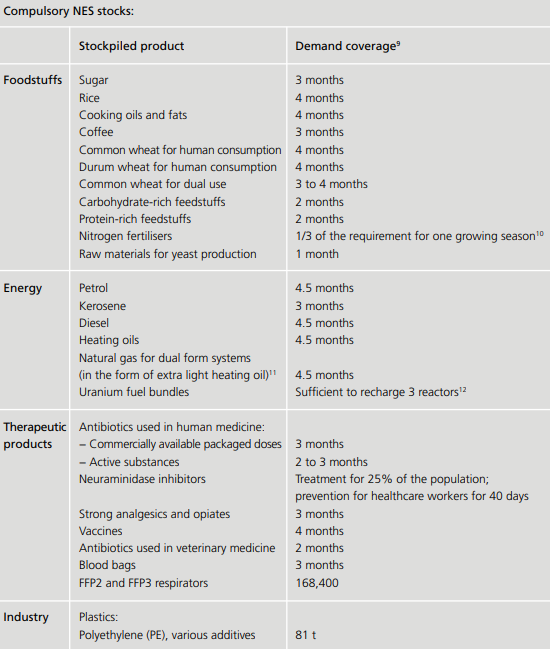18,000 Reasons Why the Swiss Are Still Awesome

Greetings friends!
Besides running the most efficient federal government among OECD countries (in percent of GDP), Swiss politicians frequently get useful things done.
Basic competence among bureaucrats is so rare that I thought I’d share the story of Peter Lehmann, the Head of Compulsory Stocks at the Swiss Federal Office for National Economic Supply. That rather dry title hides his fascinating mission:
to ensure that Switzerland’s inhabitants will have their basic needs met for a three- to four-month period in the event of significant disruptions.
What sort of disruptions, you might wonder? Anything from
- wars (food shortages in the First and Second World Wars being the reason for Switzerland first establishing the practice) to
- pandemics (medicines, masks, and disinfectants), and
- strikes in France (leading to an aviation fuel shortage at Geneva airport) to
- drought (barges on the flow-shrunken Rhine with reduced carrying capacity leading to a fertilizer squeeze).
What’s in Switzerland’s National Economic Supply?
Switzerland is quietly competent in a great many things, but we rely on imported foodstuffs to a significant degree, and almost entirely on imported fertilizers for our domestic agriculture. Switzerland is studying whether to increase reserves in light of the precarious state of world affairs and other measures we might take to manage complex international supply chains.
My favorite item in our reserves: More than 18,000 tons of coffee beans. The outcry stirred up by authorities’ 2019 plans to remove coffee from the emergency stockpile led to a swift course reversal. While coffee may not deliver calories to keep people alive, politicians were not prepared to test the ire of their potentially caffeine-jonesing citizens.
We have foodstuffs intended to provide 2,300 daily calories per inhabitant for at least three months: things like sugar, rice, and wheat.
We have fuel, heating oil, and natural gas — even uranium fuel to keep three reactors running. Because electricity cannot be stockpiled, the Swiss federal government in 2022 approved the construction of a reserve power station, and it was already operational less than a year later. What foresight!

Competency in government is as wonderful as its absence is terrible
Do you know what happens when the government and businesses don’t consider themselves adversaries? They can work well together. In this case, some 300 companies in the relevant sectors maintain the stockpiles directly. Think of a grain mill that holds extra wheat for milling into flour.
The cost for this is borne by the Swiss citizens, to the tune of just 13 Swiss francs per person per year. Isn’t that lovely? Calmly efficient, maintained at a marginal cost, with requirements regularly revisited and revised.
Imagine for a moment what would happen if the U.S. tried to do something like this. The up-front infighting over priorities, massive administrative overhead, and Kafkaesque red tape mandating minority-owned companies to employ only union-organized employees who’ve undergone mandatory DEI training.
All this would be punctuated by politicians jockeying to steer lucrative contracts to their cronies — and that’s the money that is merely wasted and not lost to rampant fraud.
I do not mean to pick on the United States. Plenty of countries would likely struggle to perform well the task of maintaining such national emergency supplies. How would Russia manage it? Or India? Or much of Africa and South America.
I bet many countries would manage swimmingly. The Netherlands comes to mind. And Estonia. Singapore, surely. Perhaps China? Once I would have unhesitatingly placed Great Britain on the list of countries with competent administrators. Based on copious comments from friends living there, I’m no longer sure.
Contingency planning as a marker for the health of society
We need not accept incompetence (or worse) by our leaders and bureaucrats as inevitable. Finding better ways starts with recognizing that the broader decay we observe cannot entirely be chalked up to those in power. For more on this, see Switzerland Spanks the U.S. in Everyday Sustainability.
The priorities we set as societies reflect our values as individuals. If roads and bridges are falling to pieces around us while educational performance, life expectancy, and general happiness are also falling, that’s a sign that our society is unwell. That we are unwell.
I used to think contingency planning for unlikely eventualities was an expensive waste of time. I’ve long since come to appreciate that the mindset such planning requires supports so much more in a healthy society.
If we cannot be bothered to take care that our basic needs are met, who do we expect will do so for us? Where do we think this attitude will lead?
Be well.
One way to get at least your intellectual curiosity needs met is to read more of my work. You may not agree with me always, but you’ll grapple with fun topics.
PS — I was inspired to write this article by a piece I read in the Swiss Review. This is a magazine for Swiss citizens living outside Switzerland, six issues a year to keep us connected to the homeland. How nice is that?






Member discussion